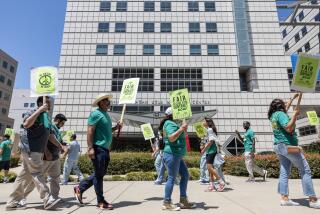UC regents to vote on increasing tuition and student fees by $342
The University of California is proposing to raise tuition and the student services fee for state residents by 2.7%, an increase of $342 to a total of $12,972 for the 2018-19 academic year.
The budget proposal, which UC regents are set to consider Wednesday, would mark the second consecutive tuition increase after a freeze of several years. Nonresident students would pay an additional $978 in supplemental tuition, bringing their total to $28,992.
Increased financial aid would cover the higher costs for more than half of the system’s 180,000 California resident undergraduates who already pay no tuition, UC officials say. Those students also would receive about $100 more each for other expenses, such as housing, food and books.
If approved, the increases would raise about $137 million. UC officials say the money would be used for more financial aid, enrollment growth, faculty, courses, graduate student fellowships, expanded mental health services, counseling and academic advising, technology upgrades, library support and building maintenance. A planned increase in contributions to the employee retirement fund would be shelved under the proposal.
“The proposed 2018-19 budget plan would enable the University to continue to provide extraordinary levels of access, affordability, and excellence to current and future generations of UC students amid a complex set of budgetary circumstances,” the proposal says.
Gov. Jerry Brown proposed a 3% increase in base funding for the UC and Cal State systems in his 2018-19 budget plan unveiled this month, down from a 4% increase in each of the last few years. University leaders have expressed concern about the smaller increase, but the governor made clear he believed it was enough — and that he would oppose any tuition hike.
“I think they need a little more scrutiny over how they are spending things,” Brown said at a Jan. 10 news conference. “They’re gonna have to live within their means…. They’ve got to lower the cost structure, and there are tools to do that, and they need to step up and more creatively engage in the process of making education more affordable.”
Some regents and students have pushed to delay a vote on any tuition hike to give them more time to lobby the Legislature and governor for more money.
Lt. Gov. Gavin Newsom, an ex-officio regent, opposes a tuition increase because “it lets the Legislature off the hook of addressing the state’s underfunding of public higher ed,” Rhys Williams, Newsom’s spokesman, told The Times in a text this week.
UC Berkeley senior Rigel Robinson, a leader with the UC Student Assn., said students planned to protest the proposed increase at the regents meeting at UC San Francisco.
“The UC ought to join students in pressuring the Legislature and the governor’s office to shape a budget that truly funds the UC, not further pushing the fiscal burden on students,” he said in a text Friday.
UC says that available per-student funding from the state, tuition and fees, and general university funds has declined by about $11,000, or 31.2% in constant dollars since 2000. That’s in part because spending has grown on financial aid, pension costs and record enrollment increases of 90,000 students since 2000, UC officials say.
The vote on the tuition proposal was moved up a day, to Wednesday, to avoid a conflict for ex-officio regents who will attend Brown’s State of the State address on Thursday.
State Assembly Speaker Anthony Rendon and others had asked UC President Janet Napolitano to change the date so more could attend the meeting. Student regent Paul Monge and two other student leaders had asked that the vote be moved to the March meeting at UCLA, because the Westwood campus is accessible to more students than UC San Francisco, which has no undergraduate campus.
Despite the scheduling change, Rendon will not attend the regents meeting because he has a “fully booked day in the Capitol,” his spokesman said. Newsom is scheduled to attend.
More to Read
Sign up for Essential California
The most important California stories and recommendations in your inbox every morning.
You may occasionally receive promotional content from the Los Angeles Times.











